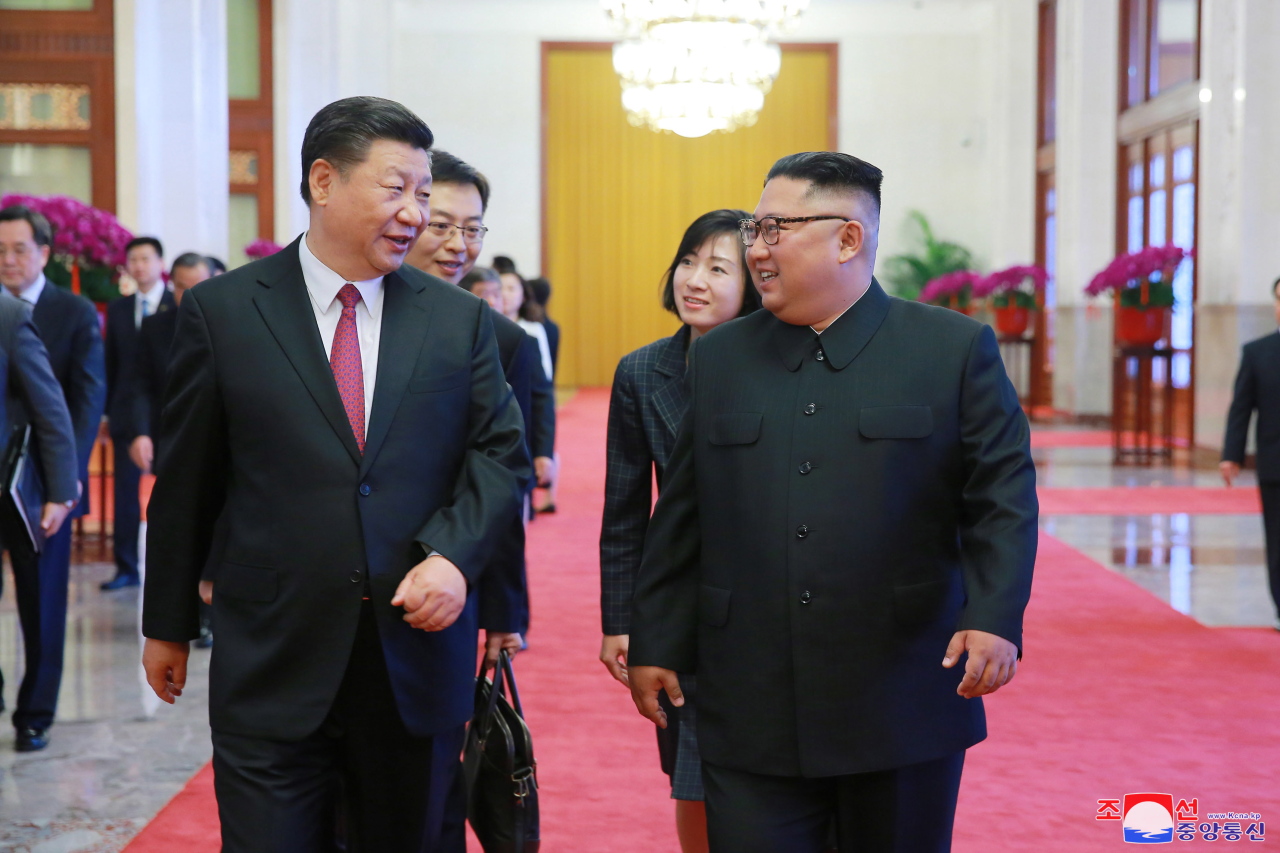With Chinese President Xi Jinping set to visit North Korea this week, all eyes are on whether his visit will create new momentum to move forward stalled denuclearization talks between Washington and Pyongyang.
State-operated media outlets in China and North Korea announced Monday night that the Chinese president is scheduled to make a state visit to North Korea on Thursday and Friday. According to Chinese state broadcaster CCTV, the two leaders will discuss the situation on the Korean Peninsula and push for progress.

Chinese President Xi Jinping (left) and North Korean leader Kim Jong-un (Yonhap)
Scheduled just a week before the Group of 20 summit in Japan, speculations are rampant on the intentions of the communist leaders. During the G-20 summit slated for June 28-29, Xi is expected to discuss their ongoing trade war with US President Donald Trump.
The US president is expected to visit Seoul after the Osaka summit to discuss the denuclearization issue.
Timing of Xi’s visit
Xi’s trip to Pyongyang will be the first by a Chinese president in 14 years, since Hu Jintao was hosted by Kim Jong-il, the late former leader and father of North Korean leader Kim Jong-un, in 2005.
While China is the sole and major ally of North Korea, their relationship appears to have soured since Beijing backed a series of UN sanctions against Pyongyang over its nuclear provocations.
Efforts for improvement were seen last year when Kim made a surprise trip to Beijing in March 2018. Not only was it Kim’s first visit to China, it was also the first known trip out of the North he had taken since assuming office in 2011.
Since then, the North Korean leader has met with Xi in China three more times. As for Xi, he had previously visited Pyongyang in 2005 and 2008, as a government official and vice president, respectively.
CCTV said Xi’s trip this week would mark the 70th anniversary of the establishment of diplomatic ties between the countries.
In response to the announcement Monday, the South Korean government said it believes Xi’s meeting with Kim could contribute to efforts toward denuclearization and peace on the Korean Peninsula.
In a written statement Monday, the presidential office said the government had been aware of the visit since last week.
An official from the presidential office elaborated Tuesday that the government has been closely cooperating with the Chinese government, and that Xi’s planned trip may also reflect South Korea’s “intentions.”
“Regarding denuclearization of the Korean Peninsula, the United States and China share a complete consensus. Xi has also openly spoken about the need for dialogue for peace on the peninsula,” the official said.
South Korea and China have agreed to hold bilateral talks at the G-20 summit next week.
The White House also expressed hopes of making progress in denuclearization after China’s announcement, saying the world is focused on Kim’s commitment.
“Our goal is to achieve a final, fully verified denuclearization of the DPRK as agreed to by Chairman Kim,” a White House official told Yonhap News Agency, referring to North Korea by its official name, the Democratic People’s Republic of Korea.
Present or pressure?Experts say the meeting of the two communist leaders may create momentum for the resumption of denuclearization talks that reached an impasse after the summit between Trump and Kim ended without an agreement in late February.
“Amid the heightened tensions between the United States and China over trade, fence-mending efforts will be needed on Beijing’s part,” Cheong Seong-chang, a senior researcher at the Sejong Institute, told The Korea Herald.
“I believe Xi would pressure North Korea to be more active in the denuclearization negotiations, and it would be like a present for Trump,”
The timing of the visit appears to reflect more of China’s needs, according to Hong Min, director of the North Korean research division at the Korea Institute for National Unification.
“Xi can show China has the power to bring North Korea back to dialogue (for denuclearization), using it as a leverage to influence the trade negotiations with the US,” Hong said, adding that it will also provide an opportunity for China to reiterate that it is a critical stakeholder in the region.
As for North Korea, Xi’s support would aid in stabilizing internal politics, Hong explained. With China’s support made apparent to the North Korean public, Kim would be able to justify his moves to resume denuclearization talks with Trump.
“If there is no resumption of US-North Korea negotiations, there is always a risk of things sliding backward in a very negative direction,” Bonnie Glaser, a senior adviser at the Center for Strategic and International Studies, said in an interview with Voice of America, hinting that strong reactions involving missiles and nuclear tests may follow.
Skeptics, on the other hand, believe Xi’s visit could reinforce the position of North Korea against the United States, and also provide support behind the scenes.
Shin Beom-chul, a senior researcher at the Asan Institute for Policy Studies, said Xi’s trip to Pyongyang had largely been expected, as this year marks the 70th anniversary of their diplomatic ties.
“Before, it appears to have been a burden for the Chinese leader to go to Pyongyang because the United States will not like it. But the trade conflict, which is at its peak, may have led China to plan the trip,” Shin said.
By Jo He-rim (
herim@heraldcorp.com)






